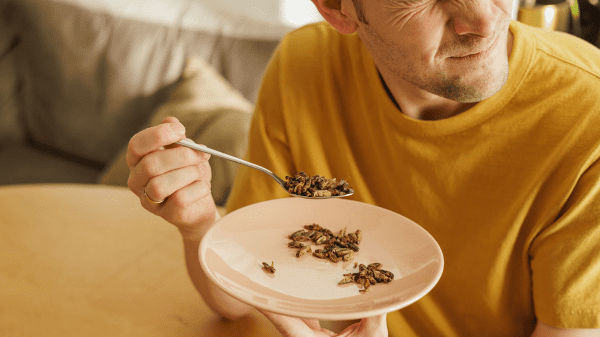Every week we see a new story about venture capital investing in companies raising insects for human consumption.
A recent study projects the edible insect market to grow to a $6 billion worldwide market by 2027.
Here are two main reasons they give: There are increasing food shortages, so insects are a cost-effective way to feed the growing global population. And secondly, they say insects are more environmentally friendly than our current animal protein options.
This brings up two questions for me: What’s this trend’s impact on the fresh produce industry, and can it catch on in North America?
I have my opinions, but I wanted to consult two dietitian experts on theirs.


Amy Myrdal Miller, president of Farmer’s Daughter Consulting, registered dietitian and culinary and foodservice specialist for the Produce for Better Health Foundation BB #:157162, says consumer interest in the U.S. is negligible.
Americans have no shortage of animal protein options, and on the environmental front, the only demographic she’s seen have any interest has been Millennial men.
“Some cultures include insects as part of their diet, but once domesticated animals came along, most people preferred it and grew stronger and bigger,” she said.
Myrdal Miller also said she’s seen very little in nutrition research on insects’ dietary quality, and few of the insect protein startups have nutrition experts involved.
As far as the media and social media hype, she said, “Much of it is misinformation and disinformation against animal ag. It’s on emotion, not science.”
Annette Maggi, registered dietitian, president of Annette Maggi and Associates, and PBH retail accounts manager, said she’s noticed increasing coverage of insect protein for human, but American food culture doesn’t seem like a fit.
“Consumer perception is the biggest hurdle,” she said. “I think it’s a hard sell in the U.S. Maybe it has a chance as a novelty or to taunt your friends to try it.”
Maggi said insect protein in the U.S. has much to overcome besides little consumer interest. For instance, it’s not currently regulated by the FDA or USDA, so there’s a food safety hurdle.
She also said the sustainability angle is suspect since most proponents don’t compare how much the resource inputs produce in grams of protein output. In other words, it takes an awful lot of insects to provide the nutrition of few or one animal.
Additionally, she said, there are better protein alternatives already in the market such as pea protein, mushrooms or walnuts, that don’t have many of the issues insects have.
Maggi asked if insect protein was a legitimate option for Americans, would the federal government include it in its feeding programs? How would users of these programs react to that option?
Threat or complement to produce?
Back to fresh produce, could insect protein be a threat or complement or have any impact?
Maggi said she doesn’t see it as any threat, as consumers don’t eat food in isolation, but generations have been trained to see animal protein as the center of the plate, and it’s hard enough to change that to see fruits and vegetables as deserving to have half the plate, as nutrition guidelines say.
In Europe, there’s an effort to appeal to children since adults have already formed many of their eating habits.
Malnourishment in the U.S. is about the wrong mix of foods, she said not lack of food, and insects wouldn’t solve or help this problem.
Likewise, Myrdal Miller sees no threats from insects to fresh produce. The threats remain other food categories in the market, and certainly not other produce companies or forms.
She said it’s possible that some of the research and technology in insect protein could benefit the produce industry.
These two nutrition professionals mostly stayed away from the “yuck” factor of consuming insects, although Maggi said cricket powder has a strong odor that puts off most consumers.
As a different kind of food professional and American consumer, I can say I won’t eat insect protein any time soon. Meat is good and nutritious, as are fruits and vegetables.
Eating insects is just too gross for me.
I prefer the spot on the food chain that eats the animals who eat the insects. I suspect the vast majority of Americans agree.



